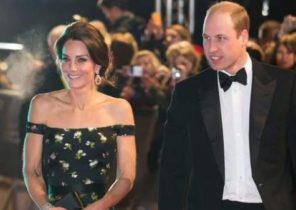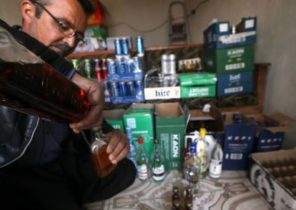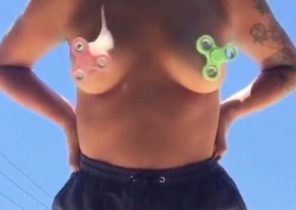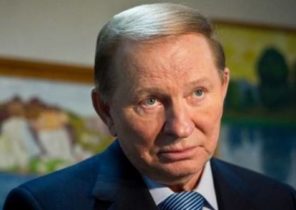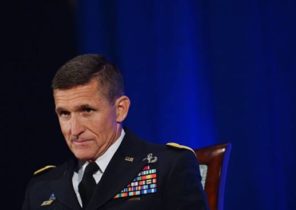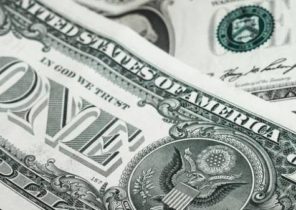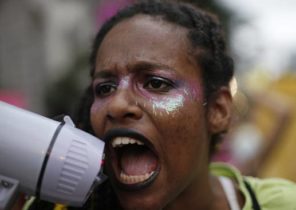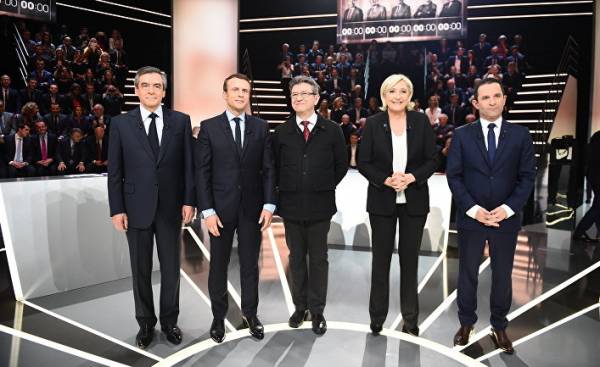
Opinions about Russia in the presidential campaign clearly show their differences and antagonism. In addition, the analysis of the statements and programs of the candidates allows to select an established political tradition of “main line” or rather curious changes to her.
In any case, the debate showed candidates as a clear split, and amazing intimacy.
But let’s try to briefly characterize the positions of the main contenders in Russian studies, while avoiding unnecessary simplifications.
Let’s start with Natalie Arto (Arthaud Nathalie) and Philip Harris (Philippe Poutou), whose Trotskyist views form the basis of their openly hostile attitude to Russia today: it is perceived as a capitalist, reactionary and neo-imperialist country, very far from desirable their proletarian democracy.
Benoit Amon (Benoît Hamon), in turn, constantly stressed at the rallies and in the media his abhorrence of Russia, where Putin runs the show, the enemy of Europe and terrible autocrat with the devil’s expansionist plans.
But let’s allow him to speak, since his words are clear and unambiguous. “We are dealing with the aggressive imperialism of Russia, with which it is necessary to behave rigidly and without favour”. It should be noted that Amon criticizes Russian policy of Hollande and considers its too soft that it sounds more than amazing: throughout his mandate, Hollande celebrated the banal and simplistic, but at the same time constant and fierce Russophobia.
Amon picks up part of the rhetoric of the socialist party that ought to go along with the cold war. He scares the prospects for the subordination of France Russia considers unacceptable any dialogue with it and Putin is a Scarecrow.
“The annexation of Crimea and Subversion of Ukraine’s sovereignty… And then what? A direct threat to many small republics.”
In such statements Amon about Russia is not surprising. Because he is none other than the little bureaucrat and dogma of the party, which ideologically was formed more than 25 years. He simply reads Atlanticist catechism of the motion, which was inherited from the French section of the international Worker during the cold war.
Let us turn to Jean-Luc Mélenchon (Jean-Luc Melenchon) who went against Benoit Amon on the question of Russia during the presidential debates.
“The first thing to do in Europe, to convene a conference of security from the Atlantic to the Urals, since all the tensions are linked to the fact that after the collapse of the Soviet Empire nobody talked about boundaries. (…) It’s time to discuss boundaries. Not to fight and negotiate.”
This, following the logic of hostility to Russia, Amon felt the need to reply: “It is extremely dangerous. (…) I believe that today the treaties should be implemented with full respect for international legitimacy. (…) It is unacceptable that Putin is annexing the territory of a sovereign state, considers it lawful to wage war with a neighbouring country”.
The media regularly accuse of Mélenchon in the “connivance” of the Cuban and Venezuelan regimes, and in sympathy with the Russian authorities, reprehensible. As to the leadership of Russia, it is officially trying to keep distance and careful in wording their statements.
Although it’s easily possible to put in the camp of those who demand a more balanced French policy in the relations between East and West, a reminder of the undemocratic Russian regime and its “reactionary” policy does not allow us to attribute to him an insatiable love for Moscow.
Only “extremists” from the current unitary political logic seems Décodeurs from Le Monde and Libération editors can take it to the extreme and present it to the friend of Russia, as they write, for example, about his position on Syria: “Mélenchon confirms his love for Vladimir Putin or Jean-Luc Mélenchon supports Vladimir Putin and Russia”.
Next to Mélenchon, you can put Asselin françois (François Asselineau), whose position on Russia, apparently, is fundamentally contrary to the “loyalty” of left-wing Atlanticist and Champions of Europe of right-wing and centrist.
Asseline, does not consider himself a nationalist, but wants independence from France, the USA, NATO and the European agreement condemns and resolutely seeking withdrawal from the EU and the Eurozone.
He advocated a policy of friendship with Russia and China, BRICS and the Arab-Muslim world, equal cooperation with Africa and pacifist world politics.
Nicolas DuPont-Aignan (Nicolas Dupont-Aignan), whose accusatory tone is called the defender of the sovereignty (as if we are talking about some kind of unforgivable crime), is perfectly clear in official statements. In his opinion, France should withdraw from NATO and pursue an independent foreign policy. He stands for the immediate lifting of sanctions against Russia (was introduced to Europe at the request of Francois Hollande), supports, rather Russia, and not the result of a “revolution” on Maidan Ukraine and very properly condemns latent cold war, which is fraught with the most terrible threats up to a nuclear cataclysm.
But let’s give the word to him: “In France, formed a striking Russophobia. I don’t support Putin, and I just want to see France has an independent policy from the US”.
The situation with Francois Fillon (François Fillon) is confusing. Its “proximity” to Russia known. Among all French political leaders, he certainly understands better than anyone else in this country, but in the context of the current campaign to declare good relations with the Russian leadership and particularly with Putin.
His close friend Igor Mitrofanov, a descendant of white immigrants after the 1917 revolution, as well as other familiar Russophile like Jean de Boisy (Jean de Boishue) largely contributed to his excellent understanding of traditional and contemporary Russia.
Its current problems and the desire to broaden the potential electorate forced him not to dwell on the friendship and even pushing a rather ambiguous statements about Putin.
It really be chained to the pillory if he dared to show at least some closeness to the Russian President, who vilify the French Russophobia behind a mask of fighters for democracy.
Marine Le Pen (Marine Le Pen) did not hesitate during the election campaign to visit Russia to Putin.
Her trip was a challenge, which was at the same time to strengthen its international status and has raised the terror filled screams coming from all human rights defenders in the major media.
In addition to the pre-election situation causes sympathy, marine Le Pen, Putin, apparently, is rooted in the ideological heritage (traditional anti-Americanism of the French right-wing) and the social concept of the Russian leader and his defence of the Christian (albeit Orthodox values) and the fight against jihadi Islamism (particularly in Syria).
In the opinion of marine Le Pen had no effect after the event arranged by NATO and its intelligence agencies “revolution” in the Ukraine, where with the support of the Europe Angela Merkel has established a regime where at least the entree openly neo-Nazi groups.
This position of the Le Pen kind of distanciruemsa from the old, traditional course natsfronta.
It should be noted that as a result of the paradoxical inversion of values entrenched in Kiev, the Nazis and anti-Semites do not cause much rejection from the United States and its European henchmen.
Let us Cheminade Jacques (Jacques Cheminade), which has long sought to break out of the shadow zone, where he pushed dominating the media and their “experts” and commentators. They all demonstrate the meanness and full of contempt indulgence, imagining it to be lost among the futuristic utopias of a crank or a perpetual candidate with a ridiculous number of votes.
However, if you see his program or listen to his speech, one gets a completely different picture. In any case, now we are interested in the direction of his thoughts in Russian studies.
Seminuda can be attributed to the left holliston (in other words, he seems to want to withdraw France from NATO), and anyone who will spend time getting familiar with his articles and speeches see in him a great connoisseur of Russian soul and culture.
Incidentally, his approach to the description of the fate of Russia rests on trudnooproverzhimom historical data, he sees it as a natural bridge between Europe and Asia in the new geopolitical concept of Eurasia.
With Emmanuel Macron (Emmanuel Macron) all, of course, is quite different. This open and zealous advocate of Europe sees Russia only through the prism of stereotypes, which every day feed us singing his praises in the press, radio and television.
Following the logic of their political and financial sponsors, banks, Creator of China’s own ideology, Makron denounces “the pernicious obsession of Fillon, Le Pen and Mélenchon Putin’s Russia”.
If you believe the headline of Le Figaro, his new friend and adviser Bairro even made such a statement: “the Fillon and Le Pen has sworn allegiance to Putin.”
In the hands of Macron and associates Scarecrow Putin is becoming a useful tool in order to push away potential voters from the Fillon, Jean-Luc Mélenchon and Le Pen. That is, in his camp quite shamelessly put Russia in an unfavorable light.
His henchmen even go to statements directly or indirectly related to the Russian cyber attacks that are supposedly designed to undermine the position of the Macron, as it was with Clinton in the United States.
But leave the Rules alone with his crazy imagination and complete list of Jean Lassalle (Jean Lassale), which, as far as we know, did not make categorical statements on Russia.
Anyway, our “well-behaved” media (Yes, them again) ganged up on him after a trip to Syria, where he paid a visit to Bashar Assad in the company Thierry Mariani (Thierry Mariani), a known friend of Russia.
However, let the reader to continue the analysis of Russophobia or Russophile candidate, noting what is peculiar to his native land peasant prudence takes him from biased and unfair judgments.
